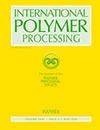Tensile properties of sandwich-designed carbon fiber filled PLA prepared via multi-material additive layered manufacturing and post-annealing treatment
IF 1.1
4区 工程技术
Q4 ENGINEERING, CHEMICAL
引用次数: 0
Abstract
Abstract Polylactic Acid (PLA) experiences widely spread applications in Fused Filament Fabrication (FFF) owing to its relatively high stiffness, strength, and environmentally friendly biodegradability. Reinforcing inclusions like short carbon fibers are introduced to virgin PLA feedstock aiming to improve the mechanical performance of FFF-made products. Nevertheless, the rigid fibers significantly reduce the ductility of the overall fabricated parts. This study prepares sandwich specimens with PLA as core and its 10 wt% chopped carbon fiber reinforced composites (i.e., CF/PLA) as shell via a low-cost FFF-based multi-material additive layered manufacturing method. The sandwich specimen has three layers, which are changed according to different material volumes, which is able to design the local strength and toughness performances of a printed part. Tensile properties of these sandwich samples printed in the different volumetric rates of virgin PLA constituents are measured. It is found that the strength of sandwich specimens with 20% vol of PLA reduces noticeably as compared to the full CF/PLA specimens. The 80% vol specimens exhibit a competitive strength as compared to the 40% and 60% vol specimens, while its toughness increases notably as compared to the other cases. Finite element simulations of the layered manufacturing process show that the thermal residual stresses of 20% vol sandwich accumulates most significantly. We also explore the effects of thermal annealing on the prepared sandwiches. Experimental results indicated that the post-annealing process improved the strength and stiffness of the sandwich specimens, while enhancing the stability of the mechanical properties of the FFF printed sandwich.多层材料增材和后退火处理制备的三明治设计碳纤维填充聚乳酸的拉伸性能
摘要聚乳酸(PLA)具有较高的刚度、强度和环境友好的生物降解性,在熔丝制造中得到了广泛的应用。将短碳纤维等增强夹杂物引入PLA原料中,旨在提高FFF产品的机械性能。然而,刚性纤维显著降低了整个制造部件的延展性。本研究通过一种低成本的基于FFF的多材料增材分层制造方法,制备了以PLA为芯、以其10wt%短切碳纤维增强复合材料(即CF/PLA)为壳的三明治试样。夹层试样有三层,根据不同的材料体积进行变化,能够设计印刷零件的局部强度和韧性性能。测量了在原始PLA成分的不同体积率下印刷的这些夹层样品的拉伸性能。研究发现,与全CF/PLA试样相比,含有20%体积PLA的夹层试样的强度显著降低。与40%和60%体积的试样相比,80%体积的试样表现出竞争强度,而与其他情况相比,其韧性显著提高。对分层制造过程的有限元模拟表明,20%体积三明治的热残余应力积累最显著。我们还探讨了热退火对所制备的三明治的影响。实验结果表明,后退火工艺提高了夹层试样的强度和刚度,同时提高了FFF印刷夹层力学性能的稳定性。
本文章由计算机程序翻译,如有差异,请以英文原文为准。
求助全文
约1分钟内获得全文
求助全文
来源期刊

International Polymer Processing
工程技术-高分子科学
CiteScore
2.20
自引率
7.70%
发文量
62
审稿时长
6 months
期刊介绍:
International Polymer Processing offers original research contributions, invited review papers and recent technological developments in processing thermoplastics, thermosets, elastomers and fibers as well as polymer reaction engineering. For more than 25 years International Polymer Processing, the journal of the Polymer Processing Society, provides strictly peer-reviewed, high-quality articles and rapid communications from the leading experts around the world.
 求助内容:
求助内容: 应助结果提醒方式:
应助结果提醒方式:


